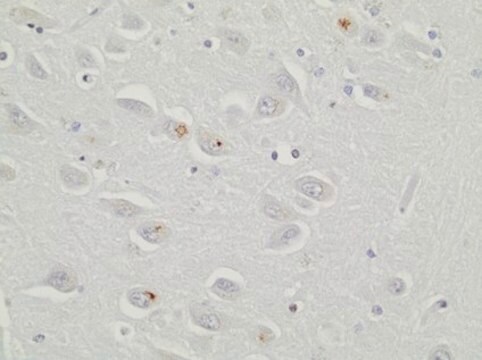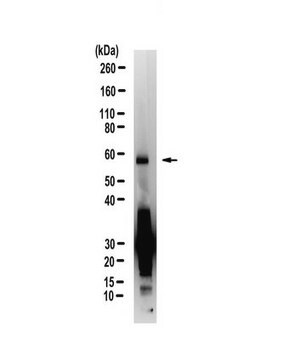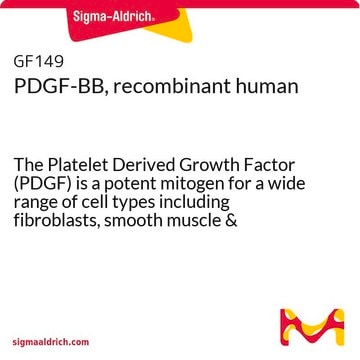ABN1645
Anti-C9ORF72 (long form)
from rabbit
Synonim(y):
C9-L, C9orf72 Long isoform, Protein C9orf72 Long isofrom
About This Item
Polecane produkty
pochodzenie biologiczne
rabbit
forma przeciwciała
affinity isolated antibody
rodzaj przeciwciała
primary antibodies
klon
polyclonal
reaktywność gatunkowa
human
metody
immunofluorescence: suitable
immunohistochemistry: suitable
immunoprecipitation (IP): suitable
western blot: suitable
izotyp
IgG
numer dostępu NCBI
numer dostępu UniProt
Warunki transportu
ambient
docelowa modyfikacja potranslacyjna
unmodified
informacje o genach
human ... C9orf72(203228)
Opis ogólny
Specyficzność
Immunogen
Zastosowanie
Western Blotting Analysis: A representative lot detected C9ORF72 (long form) in different regions of the central nervous system (Xiao, S., et. al. (2015). Ann Neurol. 78(4):568-83).
Immunohistochemistry Analysis: A representative lot detected C9ORF72 (long form) in spinal motor neurons (Xiao, S., et. al. (2015). Ann Neurol. 78(4):568-83).
Immunofluorescence Analysis: A representative lot detected C9ORF72 (short form) in lumbar spinal cord tissue (Xiao, S., et. al. (2015). Ann Neurol. 78(4):568-83).
Neuroscience
Jakość
Western Blotting Analysis: A 1:500 dilution of this antibody detected C9ORF72 (long form) in 10 µg of human cerebellum tissue lysate.
Opis wartości docelowych
Postać fizyczna
Przechowywanie i stabilność
Inne uwagi
Oświadczenie o zrzeczeniu się odpowiedzialności
Nie możesz znaleźć właściwego produktu?
Wypróbuj nasz Narzędzie selektora produktów.
polecane
Kod klasy składowania
12 - Non Combustible Liquids
Klasa zagrożenia wodnego (WGK)
WGK 2
Temperatura zapłonu (°F)
Not applicable
Temperatura zapłonu (°C)
Not applicable
Certyfikaty analizy (CoA)
Poszukaj Certyfikaty analizy (CoA), wpisując numer partii/serii produktów. Numery serii i partii można znaleźć na etykiecie produktu po słowach „seria” lub „partia”.
Masz już ten produkt?
Dokumenty związane z niedawno zakupionymi produktami zostały zamieszczone w Bibliotece dokumentów.
Nasz zespół naukowców ma doświadczenie we wszystkich obszarach badań, w tym w naukach przyrodniczych, materiałoznawstwie, syntezie chemicznej, chromatografii, analityce i wielu innych dziedzinach.
Skontaktuj się z zespołem ds. pomocy technicznej








